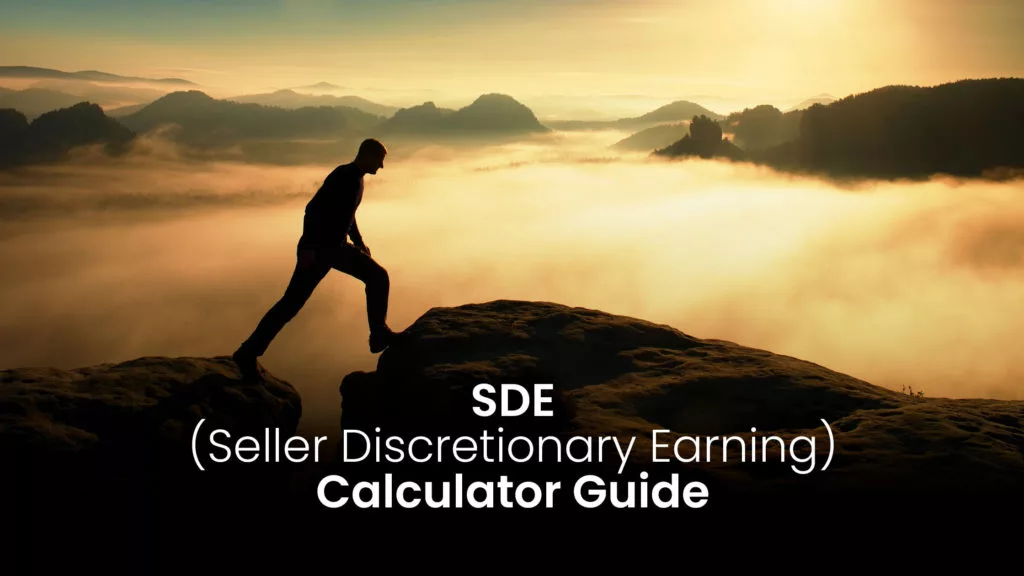- Posted on April 6, 2022
- by Benedict Dohmen
Home / Selling Your Amazon Business / SDE (Seller’s Discretionary Earnings) Calculator Guide
SDE (Seller’s Discretionary Earnings) Calculator Guide

When selling your Amazon business, one of the first things that a buyer will do is look at your financial information and calculate your seller’s discretionary earnings or SDE. Understanding and calculating your SDE before reaching out to buyers is important because it will play a significant role in their valuation processes.
This SDE (seller’s discretionary earnings) calculator guide will give you the necessary information to understand what buyers are looking at and how you can use that information to maximize your valuation.
Table of сontents:

What is Seller Discretionary Earnings?
Seller’s Discretionary Earnings (SDE) is a calculation of the total financial benefit a full-time owner and operator would derive from their small to midsize business on an annual basis.
A business’s overall SDE is generally calculated as an average of the SDE for the 1-3 most recent years, plus interim.
It takes earnings and adds back interest, taxes, depreciation, and other adjustments to show the total financial benefit. Typically, this statistic is used to assess enterprises with gross yearly sales of less than $1,000,000.
SDE is a method of standardizing a company’s earnings, so that they may be compared more precisely to the earnings of other companies and the industry as a whole.
For example, an Amazon FBA brand may want to know how much money it will make in a year. Calculating their SDE provides a clear indication of how much profit they stand to make.
What is included in the seller's discretionary earnings?
- The earnings of a business before income taxes
- Depreciation
- Amortization
- Interest
- Non-operating income and expenses
- Non-recurring income and expenses
- Owner’s compensation
SDE adjusts earnings for past taxes, interest, depreciation, and other factors. By calculating SDE, you’ll gain a better grasp of a company’s profit potential and value – and their prospective improvements.
What is SDE in business valuation?
A business valuation determines the value of the owner’s interest in the company – the simplest way to calculate this is to use the seller’s discretionary income (SDE).
Because it is the core of small business valuation, Seller’s Discretionary Earnings are a crucial indicator to consider when assessing a company. The SDE meaning is to determine how much money a firm brings in for its owner, regardless of who that person is.
Other Names for SDE
SDE can be referred to by other names, such as the seller’s discretionary cash. Some other terms that may come up are: adjusted cash flow, total owner’s benefit, seller’s discretionary cash flow, recast earnings, or discretionary earnings. It’s up to the Amazon aggregator to choose which term to use in legal paperwork, but SDE is the most common acronym.
How Do You Calculate Seller’s Discretionary Earnings?
It’s calculated by deducting a product’s landing cost (per unit) from the revenue from each product sale, as well as any other charges.
Assuming:
- PIT = Profit on Income Taxes
- NRE = Non-Recurring Expenses
- NRI = Non-Recurring Income
- NOE = Non-operating Expenses
- NOI = Non-operating Income
- D = Depreciation
- A = Amortization
- IE = Interest Expense
- OWTO= One Owner’s Total Compensation
Generalizing the formula;
DE = PIT + NRE – NRI + NOE – NOI + D + A + IE + OWTO
Or
SDE = Net Profit + Add-backs
Here is how to identify each section of the formula:
- Net Profit
The net profit of the business is calculated based on EBITDA or earnings before interest, taxes, depreciation, and amortization.
- Add-Backs
Add-backs are costs that the seller may incur at his or her discretion and that the buyer will not inherit after the sale. They are costs that are re-added to earnings to increase the value of a firm, such as essential expenses that the business has paid for but could be considered of personal benefit to the owner.
Add backs are important for FBA sellers because every dollar added to your total SDE multiplies several times in your final deal. Don’t neglect them, even if it’s only a few dollars.
| Most Common | Discretionary expenses | Non-Recurring | Other |
|---|---|---|---|
| Owner Payment | Personal contributions | Lawsuit settlement and other legal expenses | Car expenses |
| Owner Payment Taxes and Benefits | Business travel expenses | Software and hardware upgrade | Inventory Adjustments |
| Any owner personal expenses | Family mobile phone plan | Relocation, expansion, renovation expenses | Rent charges for home office |
| Interest | Charity | License fees | Loans |
| Depreciation and Amortization | Sponsorships | Application fees | Non operating income |
Something to keep in mind – not everything can be calculated as an add-back.
Here’s a list of all the items that don’t classify as addbacks
- Employee’s medical insurance and payments.
- Food, transport, education, and entertainment money expenses for employees
- Delivery vehicle maintenance expenses
- Marketing and promotion expenses
- Club memberships for employees
- Employees gift cards, vouchers, and discounts
What Does the Word EBITDA Mean?
EBITDA (Earnings before Interest, Taxes, Depreciation, and Amortization) shows how much financial gain a company is making and gives an estimate of how much an Amazon FBA buyer can source after purchasing a business.
EBITDA vs SDE: What’s the Difference?
Simply put, the primary distinction between EBITDA and SDE is that EBITDA does not include the owner’s pay, whereas SDE does. As a result, SDE will always be a larger site than EBITDA. It’s a good idea to compare EBITDA with SDE.
Amazon aggregators examine a company in a variety of ways:
EBITDA allows a company to be compared to another. SDE shows a company’s surplus potential.
Furthermore, EBITDA is typically used to determine the value of larger organizations, whereas SDE is utilized to determine the value of small and medium businesses.
To summarize, here are the fundamental distinctions between SDE and EBITDA:
- EBITDA doesn’t include the owner/manager’s salary, while SDE includes the owner/manager’s salary as an add-back.
- EBITDA lets buyers compare a business with other businesses, while SDE lets buyers like Amazon roll-up firms or Amazon FBA acquirers know how much they can potentially stand to make upon acquisition.
- SDE is utilized for small to medium firms with a yield of less than $5 million, while EBITDA is used for larger organizations with more extensive financial reports.
Key takeaway
With the help of our SDE calculator, you can evaluate the value of the Amazon business you’re trying to sell, gaining a stronger negotiating position.
Benitago focuses on maximizing the profit of the seller by offering a Price Match Guarantee, and 24h free business valuation.
Contact Us to find out how you can get the best possible Amazon FBA exit!
Now it is your turn – do you have a question for the Benitago team? Or maybe you want to start a conversation with like-minded individuals? Feel free to share your thoughts in the comment section below!

Related Posts.

- Posted on February 24, 2022
- by Benedict Dohmen
- Posted on February 18, 2022
- by Benedict Dohmen



